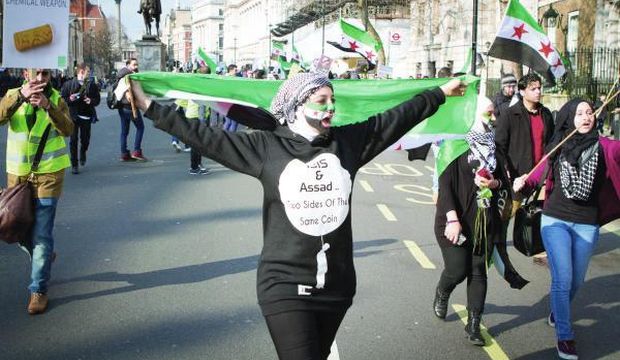
People protest in London, United Kingdom to mark the fourth anniversary of the Syrian conflict, on March 13, 2015. (Asharq Al-Awsat/James Hanna)
Beirut, Asharq Al-Awsat—Muhammad Tawfiq Al-Assad, cousin of President Bashar Al-Assad and believed to be one of the founders of the Syrian regime’s infamous Shabiha militias, has been assassinated in the village of Qerdaha, the country’s main Alawite stronghold and the Assad family’s spiritual home.
The UK-based Syrian Observatory for Human Rights—which monitors the conflict in Syria using a network of sources on the ground—said Muhammad Tawfiq was shot in the head five times as a result of a dispute with a member of another prominent Alawite family in the village, which lies in the northwestern Latakia province.
Official Syrian media outlets allied to the Assad regime however said Muhammad Tawfiq was killed “while fulfilling his national duty” fighting insurgents in the Dawreen village on the rural outskirts of the province.
A senior member of the Free Syrian Army (FSA), the armed wing of the main Syrian opposition group, the Syrian National Coalition, denied that Muhammad Tawfiq was killed during fighting in Latakia.
The FSA source, speaking on condition of anonymity, told Asharq Al-Awsat Muhammad Tawfiq was a divisive figure in the area and had previously clashed not only with members of his own Assad family but with other prominent Alawite figures in Qerdaha.
“Even until recently, his relationship with the Assad family wasn’t that great. Basil Al-Assad, the late older brother of Bashar Al-Assad, had previously thrown him and some of his aides in jail over several offenses including drug-smuggling, kidnapping and theft,” the source said.
But he was subsequently freed by Bashar Al-Assad, the source said, after the Syrian conflict erupted in 2011, in order to lead the recruitment of young Syrian men for the regime’s Shabiha militias, who have been accused of committing numerous atrocities against civilians throughout the now four-year conflict.
Other sources have speculated that Muhammad Tawfiq’s assassination was a revenge attack for an incident that occurred in 2012, as opposition forces were making inroads in the conflict, before the regime began to turn the tide of the war in its own favor.
The sources said prominent Alawite families in Qerdaha were worried about possible revenge attacks on Alawites in the village should it fall to the opposition, due to the atrocities committed by the Shabiha.
The dispute came to a head in October 2012 when Muhammad Tawfiq was spending the evening at a café owned by Arif Al-Khayyir, from the powerful Khayyir Alawite family.
An argument then broke out between the two men, with Khayyir insisting the Assad regime throw in the towel to stem the flow of blood in the country and protect its fellow Alawite clans, and Muhammad Tawfiq accusing Khayyir of betraying the regime.
The argument then allegedly turned violent, with Muhammad Tawfiq sustaining a gunshot wound for which he was put in hospital, and another Khayyir family member also getting injured in the process.
Muhammad Tawfiq, who styled himself as “Sheikh Al-Jabal,” or “the Old Man of the Mountain”—in apparent reference to Hassan Al-Sabbah, the legendary leader of the Medieval Shi’ite militia, the Assassins—has been accused of ordering numerous atrocities committed by the Shabiha.
Rami Abdulrahman, the head of the Syrian Observatory for Human Rights, told AFP on Saturday that Muhammad Tawfiq, believed to have been in his forties, had amassed a wealth reaching “millions of Syrian pounds” through using the Shabiha and his links with the regime to smuggle contraband into the country, mostly during the 1980s.
